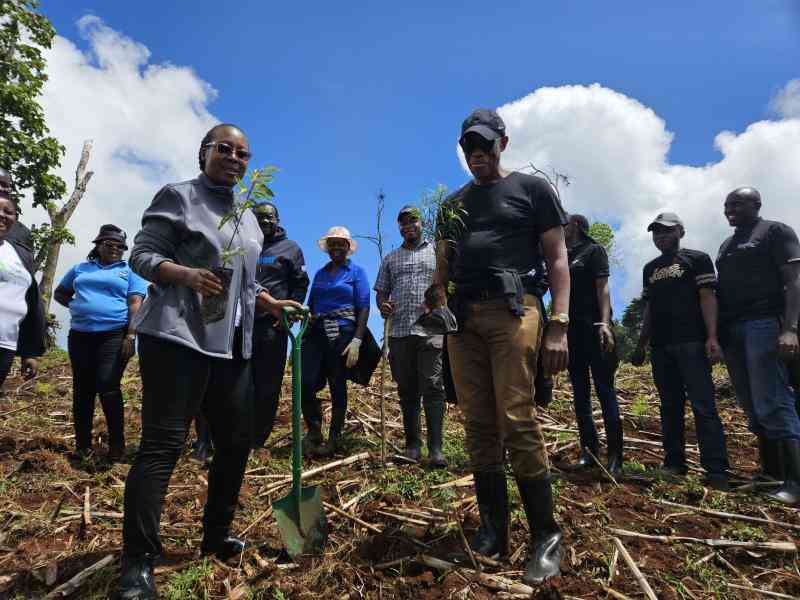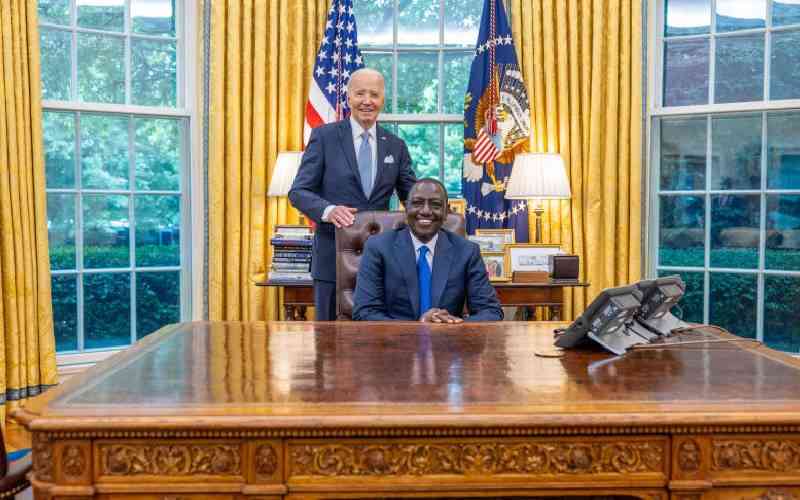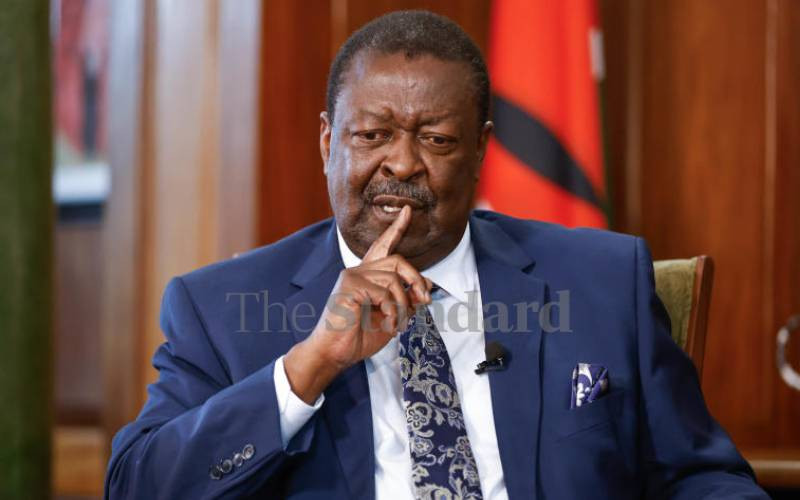Mr Gregg Smith, CEO of Frontier Services Group, sees potential in Kenya’s aviation industry due to the high demand, lack of capacity, growth in the East African Community and investment in the trading bloc’s mining sector. The logistic services company recently acquired 49 per cent of Kijipwa, a Kilifi-based, family-owned aviation firm, and has major shareholding in Phoenix Aviation. He spoke to Peter Okong’o.
Why Africa? What informed FSG’s business strategy to target the continent with its logistics services?
Gregg Smith: There are a number of reasons for investing in Africa. While Africa and African markets present tremendous investment opportunities for business in different sectors, its current infrastructure void presents challenges to penetration in many parts of the continent.
That void, however, offers opportunity for companies with expertise in integrated logistical supply chain infrastructure that supports access to markets by opening up previously inaccessible areas to investment and business.
Our Chinese partners doing business in Africa approached us wanting logistical and supply chain support for their operations on the continent. Considering Africa is expected to attract infrastructure investment to the tune of $1 trillion (Sh87 trillion) over the next 10 years, it makes sound business sense to position our expertise in supply chain logistics in alignment with this growth potential.
Our goal of establishing a broad-based logistics business will require significant investment beyond aviation.
We also expect to make investments in maritime and construction assets, among others. Notably we intend on making significant investments in local human resources in terms of hiring, training and deploying workers.
Our long-term vision is to establish and support the technical trades so that our workforce is truly Kenyan.
Why Kijipwa and Phoenix Aviation?
Kijipwa was appealing to FSG due to its strategic position near the Port of Mombasa, and the legendary reputation of its founder, Mr Alan Herd. Mr Herd has been a leader in Kenyan aircraft maintenance for decades.
With respect to Phoenix Aviation, the particular business was appealing for a number of reasons. First, Phoenix has an incredibly talented team; FSG believes its pilots, technicians and management are world class. Second, it is a large operation capable of serving a diverse customer base. Phoenix’s current fleet is also well suited to support a variety of missions.
Finally, Phoenix’s leadership team shares FSG’s vision of building a much more robust business, centred on the Kenyan aviation sector, a business that has the financial capital to invest and grow with the increasing number of multinational businesses moving into East Africa.
In a previous interview with a local newspaper, you were insistent that FSG is not a security contractor, but extremely vague on what exactly you mean by “logistics”. What is the nature of the logistics services you plan to offer to the Government, NGOs, and mining and construction companies?
Overcoming the logistical supply chain challenges in Africa — lack of road or rail access to remote areas and a difficult aviation environment — we bring tier-one aviation logistical capability. We transport people, supplies and highly specialised equipment to areas difficult to reach by any other means.
Stay informed. Subscribe to our newsletter
Our services are not standard; we provide last-mile logistics into remote frontier areas. We will leverage both our aviation and construction to enable and enhance access to remote areas.
With aviation, through non-scheduled passenger and cargo, we will support United Nations missions as well as mining and exploration sites.
With our construction expertise, we will build runways and airstrips in remote areas as well as roads and rail infrastructure from our landing sites to camps that we support, be they exploration, mining or UN mission camps.
Where required, as part of our last-mile logistics, we have the capability to construct camps to support these operations.
What is the nature of FSG’s parent company’s ties with the state-owned Citic Group in Hong Kong?
FSG is a publicly owned company with shares traded on the open market. While we do not have a majority shareholder, our two largest shareholders are Citic Group and Hong Kong-based entrepreneur Johnson Ko, each owning about 20 per cent shareholding.
Citic Group and Johnson Ko both have seats on our board. Beyond that, like any public company, we have very many shareholders.
China is already the dominant player in Africa’s mining and construction sectors. Is FSG’s African strategy purely a business ploy to tap into the billions of dollars in Kenya Government projects contracted to Chinese companies, given FSG’s close ties with Beijing/Hong Kong?
FSG is a pan-African business that will be headquartered in Kenya. Our intention and our business plan call for us to work throughout Africa, and not just in Kenya. We hope to have many customers and we certainly hope the Chinese companies are part of those.
However, we hope to work with local and multinational companies from anywhere in the world, with the UN and NGOs all making up our broad customer base. We want to work with any company that has logistical and supply chain requirements that would benefit from our last-mile services.
What informed FSG’s decision to base its East Africa offices in Nairobi?
We believe that Kenya has a terrific talent pool that we intend to bring into the business and develop because our delivery model is based on local expertise in all the countries where we will do business. The aviation infrastructure in Kenya is suitable as the hub of our operations, and the regulatory environment is, comparatively, conducive to regulatory compliant foreign investment.
FSG has a strategy to become the premier provider of logistics services in Africa. We believe that the highest-value logistics services start with aviation and the best market to launch in is Kenya, which is recognised as an African aviation hub and is certainly the gateway to East Africa.
What will distinguish the medical evacuation (medevac) services FSG plans to offer from what is already in the Kenyan market and make it a profitable venture, given that in Nairobi we already have AAR, Kenya Red Cross and the Flying Doctors Service?
The additional medevac capacity, leveraging our last-mile aviation and construction capability, penetrate closer to the sites and frontier environments where people are working. We can position our aircraft and doctors closer to the sites, shortening the emergency response time.
We believe that our medevac offering will be complementary to those already present in the Kenyan and other African markets.
In addition, we are looking to offer an increased level of care, given the nature of the customers we will support. We are considering airlifting trauma surgeons into the site when the nature of the emergency makes patient evacuation life threatening. This will require specialised aircraft that supports mobile surgery units.
What is the initial sum that FSG will invest in setting up its operations in Nairobi?
As previously disclosed, our initial investment will exceed $30 million (Sh2.6 billion).
Can you put numbers to the size of local and foreign staff that will be operating in your Nairobi offices?
Our operating headquarters will be in Kenya, and the majority of our executives will be in Nairobi. However, we expect to have employees throughout the country, initially in Nairobi and Mombasa.
At the onset, our employees will number in the hundreds and we anticipate this number to grow to the thousands in three to five years. The majority of these positions will be skilled employees and we expect those to be locals in Kenya and in other African countries.
As our delivery model is through developing local expertise, we will have a 1:1 expatriate to local ratio in our first 12 months for skills transfer and skills building.
[email protected]
 The Standard Group Plc is a
multi-media organization with investments in media platforms spanning newspaper
print operations, television, radio broadcasting, digital and online services. The
Standard Group is recognized as a leading multi-media house in Kenya with a key
influence in matters of national and international interest.
The Standard Group Plc is a
multi-media organization with investments in media platforms spanning newspaper
print operations, television, radio broadcasting, digital and online services. The
Standard Group is recognized as a leading multi-media house in Kenya with a key
influence in matters of national and international interest.
 The Standard Group Plc is a
multi-media organization with investments in media platforms spanning newspaper
print operations, television, radio broadcasting, digital and online services. The
Standard Group is recognized as a leading multi-media house in Kenya with a key
influence in matters of national and international interest.
The Standard Group Plc is a
multi-media organization with investments in media platforms spanning newspaper
print operations, television, radio broadcasting, digital and online services. The
Standard Group is recognized as a leading multi-media house in Kenya with a key
influence in matters of national and international interest.





